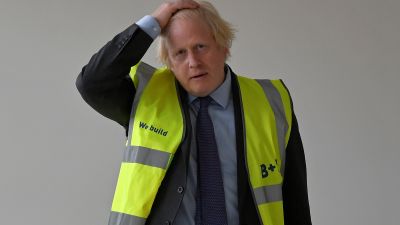Why these are the critical days for Boris Johnson's government

These may well be the defining few days of the Johnson government.
Having failed to make a towering success of the initial response to the Covid-19 crisis - by his own admission on Times Radio on Monday morning - the prime minister is now embarking on the kind of structural reform of the machinery of government and of how the government supports the economy that will determine whether he will be seen by future generations as a Homeric hero or Homer Simpson.
So far we can see the building blocks of the reconstruction, rather than the detail.
These blocks include, first, supposedly significant infrastructure investment as a response to the economic calamity that is the consequence of the coronavirus calamity - what the prime minister this morning called "doubling down" on the commitments he made in his election manifesto at the end of last year, rather than responding to the explosion of government debt with cuts to public services.
And second, they are to give more political direction to Whitehall and to people the civil service with more data scientists and those who have proven skills in "delivering" projects and assessing results, rather than those with the traditional kind of cognitive humanities backgrounds who - Johnson fears - are more expert in analysing problems than solving them. Of course when I talk about the Johnson government, what I actually mean is the Johnson/Cummings/Gove government, since that is the troika who promulgate this Red Toryism.
What is profoundly unclear - and how could it be at this early juncture, and in the mayhem of this Covid-19 era - is whether any of this will work in restoring health and prosperity.
Take the decision to turn the post of National Security Adviser, hitherto the preserve of career civil servants, into a political post, with the appointment to it of Johnson's Brexit negotiator David Frost.This could backfire horribly, if - as some mandarins fear (but they would, wouldn't they?) - the spooks and military top brass won't reveal their secrets to someone who is not really of their ilk (and Frost starts with the handicap that Johnson himself alienated much of the so-called deep state when he was foreign secretary).
And although Cummings, Gove and Johnson may be right that the Cabinet Office, at the heart of government, is no longer fit for purpose, in replacing Sir Mark Sedwill in the lynchpin role of cabinet secretary, it will not fit their purpose in the long run if they appoint a flunky without the backbone to tell them when they are wrong, or choose someone who does not properly understand the Byzantine ways of Whitehall, and is therefore unable to bend other public servants to their will.
In other words, and having already relegated his cabinet colleagues to a role of marginal influence, Johnson is about to embark on a bold experiment that - strikingly for this Brexiteer in chief - is quite frankly not very British: the pursuit of French-style "grands projets" and modernisation of infrastructure; and the marginalisation within the machinery of government of the Oxbridge generalist (by a PM who is the quintessence of Oxbridge generalist bluffer).
It is a quiet, but revolutionary coup. And like all coups, it is high risk.